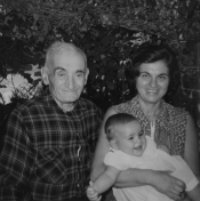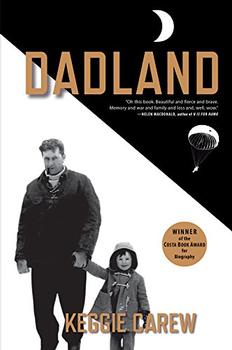Summary | Excerpt | Reviews | Beyond the book | Read-Alikes | Genres & Themes | Author Bio

An Armenian Odyssey
by Dawn Anahid MacKeenThe Hundred-Year Walk is a harrowing account by Dawn Anahid MacKeen of her grandfather Stepan Miskjian's survival during the Armenian Genocide (1915-1918), as well as her own travels to Turkey and Syria in an attempt to retrace his footsteps and better understand his ordeal.
Although her grandfather died when Dawn was a toddler, her mother, Anahid, passed along the account of Stepan's remarkable journey. Dawn came to feel that the story "was our family's heirloom, our most precious bequest, and it was inherited by every subsequent generation – along with the burden of telling it again." After spending years in New York as a journalist, "telling other people's stories and ignoring my own family's incredible one," she finally read a translation of her grandfather's memoir, originally published in 1960 by an Armenian press, and came to understand exactly what he and millions of other Armenians had experienced. "Doing nothing felt like forgetting, and forgetting genocide seemed almost as heinous as the crime itself," she writes, and so began her project to chronicle his experiences.
 MacKeen's narrative is fascinating from start to finish — even her near failure to find enough material for the book is fairly suspenseful. Stepan's published memoirs don't begin until 1916, leaving out critical information about the ramp-up to the genocide as well as its early days. It was only the near-miraculous discovery of Stepan's hand-written notes covering the missing years, distributed decades ago to his children and forgotten on bookshelves and in attics, that allowed MacKeen's writing to move forward.
MacKeen's narrative is fascinating from start to finish — even her near failure to find enough material for the book is fairly suspenseful. Stepan's published memoirs don't begin until 1916, leaving out critical information about the ramp-up to the genocide as well as its early days. It was only the near-miraculous discovery of Stepan's hand-written notes covering the missing years, distributed decades ago to his children and forgotten on bookshelves and in attics, that allowed MacKeen's writing to move forward.
With all the skill of an action-adventure novelist, she recounts how close Stepan came to death on several occasions, providing numerous scenes of nail-biting tension. Historical facts such as actions taken by the Turkish government and the international community are seamlessly interwoven into the personal account. The end result is an excellent history book that includes MacKeen's grandfather's specific story.
MacKeen helps her readers understand the build-up to actions against the Armenian residents of the Ottoman Empire – how the Muslims of the area came to see the Christian Armenian population as a threat, the gradual increase of intolerance toward this group of citizens, and how the country's leadership could conduct and ultimately justify their murder of 1.2 million men, women and children. Although I've read several books covering the genocide, I don't recall any of them reporting on the social and political developments during this time period with as much clarity. For example, incremental steps — such as an increasingly hostile publicity campaign — were taken to convince the Turkish Muslim population that their Armenian Christian neighbors were actually their enemies. It was reminiscent of the groundwork the Nazis laid down for the extermination of their Jewish population, although this shouldn't be all that shocking since Germany was well aware of what had gone on in the Ottoman Empire; before his invasion of Poland in 1939 Hitler said, "Kill without pity or mercy. Who still talks nowadays of the extermination of the Armenians?"
Unsurprisingly, the narrative can be pretty brutal at times, so sensitive readers might want to keep this in mind. Although the descriptions could certainly have been more graphic, the scenes are painful enough. Stepan sees — and eventually becomes inured to — incredibly gruesome as well as heart-rending sights, such as soldiers bragging about the most efficient way to kill a caravan of orphans, and mothers selling their young daughters to Arab men as the only way to preserve the girls' lives.
Deciding she needed to better understand what Stepan experienced and see the land through her own eyes, the author traveled to Turkey and Syria in 2007. Her resulting experiences are interspersed throughout, and these sections may be the book's only weakness. On the one hand MacKeen's recent travels may attract readers looking for a more modern touch-point, something to tie the narrative to the present and make it seem more relevant. On the other, almost a century later, nearly all the landmarks MacKeen sought were unrecognizable, so the connection I was expecting didn't happen for the most part. The author comes across as something of a wimp, complaining about the heat and dust and some of the rigors of 21st-century travel, particularly in contrast with the hardships endured by her grandfather. While this was somewhat off-putting, I'm sure it helped her appreciate how remarkable Stepan's survival truly was, so perhaps my opinion is overly judgmental. These chapters make up a small percentage of the narrative and improve toward the end, so overall I didn't find they overly impacted my appreciation of the book.
The Hundred-Year Walk is difficult to process, as it's never easy to read about people being cruel to others, or even worse, dispassionately killing them. It is however, an important book that reminds us that humanity is capable of such acts. It's both well-written and compelling, and highly recommended to anyone who wishes to know more about the Armenian genocide or who has an interest in stories about survival in the face of near-certain death.
Newly widowed, the eighty-five-year-old Stepan stands beside his daughter Anahid and granddaughter Dawn (the author) in 1971. Image, courtesy of the publisher.
![]() This review was originally published in The BookBrowse Review in March 2016, and has been updated for the
February 2017 edition.
Click here to go to this issue.
This review was originally published in The BookBrowse Review in March 2016, and has been updated for the
February 2017 edition.
Click here to go to this issue.

If you liked The Hundred-Year Walk, try these:

by Keggie Carew
Published 2018
A spellbinding journey into surprising and shady corners of twentieth-century politics, a rackety English childhood, the poignant breakdown of a family, the corridors of dementia and beyond.

by Aline Ohanesian
Published 2016
Moving between the last years of the Ottoman Empire and the 1990s, a story of passionate love, unspeakable horrors, incredible resilience, and the hidden stories that haunt a family.
They say that in the end truth will triumph, but it's a lie.
Click Here to find out who said this, as well as discovering other famous literary quotes!
Your guide toexceptional books
BookBrowse seeks out and recommends the best in contemporary fiction and nonfiction—books that not only engage and entertain but also deepen our understanding of ourselves and the world around us.